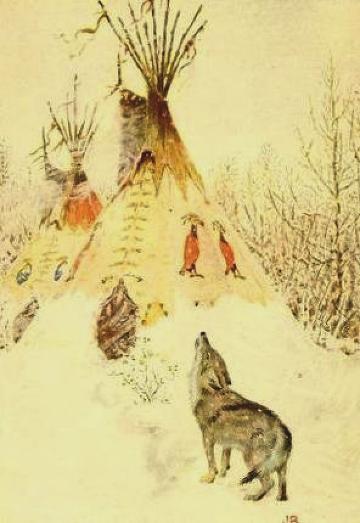 |
Canku Ota
|
 |
|
(Many Paths)
|
||
|
An Online Newsletter
Celebrating Native America
|
||
|
March 2021 - Volume
19 Number 3
|
||
|
|
||
|
How the Indians Obtained
Dogs
|
||
|
by The South Peace Historical
Society
|
||
|
There lived alone one winter a hunter, his wife and their only
child, a little boy of four years. Deep snow covered the ground,
and game was scarce. One day the hunter discovered the track of
a buffalo and followed it but he failed to overtake the animal.
Late at night he returned to his tipi and, before entering, stopped
to scrape the snow from his moccasins. But as he stood outside in
the snow, he heard his little boy crying from hunger within the
tent, and the voice of his wife trying to comfort him. Resolutely the man turned back into the night and prayed for help as he resumed his hunting. Just before dawn he came upon other buffalo tracks and followed them. Suddenly a wolf ran up to him, and said, “My son, why are you weeping?” “I am in sore need. My wife and child are starving.”
“Hide behind these bushes here”, said the wolf, “and use my bow and arrows. I will drive the buffalo toward you. But be sure to use my bow and arrows, not your own.” The wolf disappeared, and the hunter examined the bow that had been given him. It was much smaller than his own, and seemingly much inferior. Yet he remembered the wolf’s instructions and when he heard it driving the buffalo toward him, he took up the small bow and shot six animals, one after another. When the seventh and last buffalo approached him, however, he took up his own box and shot. The animal escaped. Now the wolf returned. “What luck did you have?” it asked. “I killed six with your bow and arrows. For the last one I used my own bow, and it escaped.” “I warned you not to use it”, the wolf said. “However, we have meat enough.” Together they butchered the animals, and at the wolf’s request the hunter set aside portions of two buffalo for his companion’s children. He then carried as much meat as he could pack on his back to his starving wife and child. That same evening, after they had satisfied their hunger, they dismantled their tent and moved to where the carcasses lay. There the wolf joined them with all its family and lingered fearlessly around their camp. The woman fed the animals with waste cuts of meat until they became quite tame. They would even allow her to harness travois to their backs. Thereafter they always remained with the Indians and became their dogs. |
||
|
|
||
|
|
||
| Canku Ota is a free Newsletter celebrating Native America, its traditions and accomplishments . We do not provide subscriber or visitor names to anyone. Some articles presented in Canku Ota may contain copyright material. We have received appropriate permissions for republishing any articles. Material appearing here is distributed without profit or monetary gain to those who have expressed an interest. This is in accordance with Title 17 U.S.C. Section 107. | ||
|
Canku Ota is a copyright ©
2000 - 2021 of Vicki Williams Barry and Paul Barry.
|
||
 |
 |
|
|
The "Canku
Ota - A Newsletter Celebrating Native America" web site and
its design is the
|
||
|
Copyright ©
1999 - 2021 of Paul C. Barry.
|
||
|
All Rights Reserved.
|
||
